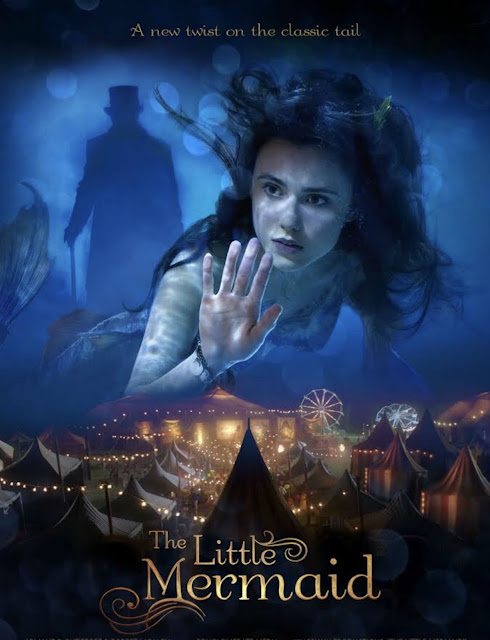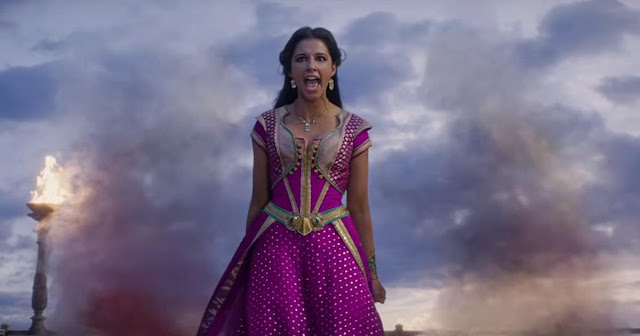Review: The Little Mermaid (2018 Indie Flick)
Of the three live-action adaptations of "The Little Mermaid" that were announced within the past couple of years, only one of them has already finished filming and has a limited release in AMC theaters as of last weekend. Many of us who are fans of the original fairy tale took issue with Armando Gutierrez's The Little Mermaid trying to market itself as a new take on Hans Christian Andersen's story when the trailer bears virtually no resemblance to it. I liked when their Facebook page had the title A Little Mermaid, as that was more honest and made it sound like an original story, but it was soon replaced with the attention-grabbing title that would hopefully confuse people just enough into thinking it was made by Disney and convince them to go and see it. Ordinarily, I wouldn't even bother reviewing such a mediocre low-budget production that was made by someone without any prior film experience, but the fact that it had a theatrical release and marketing campaign makes me feel obligated to tell curious fans what they're missing.
Armando Gutierrez's The Little Mermaid begins with an aesthetically pleasing but cheaply made three-minute animation sequence that recounts the entirety of the classic Hans Christian Andersen fairy tale with a few adjustments. Then we cut to an old lady telling her granddaughters about live-action Mississippi in the 1800s, and it's all downhill from there. The narration choice is odd because it feels like a story within a story within a story. The animated sequence is narrated by Elizabeth, the little mermaid, and then it cuts abruptly to the grandmother talking about the two main characters of the film, a reporter named Cam and his niece Elle. Even though it turned that I was wrong about the identity of the old lady, the storytelling sequences with her added nothing to the plot of the film. After the animated portion ended, there were so many inconsistencies I found it rather difficult to suspend my disbelief for the duration.
In this version of "The Little Mermaid," Elizabeth gave up her soul to become human instead of her voice to a wizard instead of a sea witch. Since the prince married another woman, the wizard got to keep her soul, which somehow made her his possession that he chose to use as a cheap carnival attraction. The most obvious question here is that if she still had her voice, why didn't she just tell the prince he was marrying the wrong girl and that she was the one who saved him? The fairy tale elements never get mentioned again after the animated sequence, which proves that the movie was just using the story to get a bigger audience. The wizard who possesses Elizabeth's soul is a mustache-twirling top hat-wearing Dr. Facilier knock-off named Locke. It is so ridiculously obvious how evil Locke is that he might as well have been holding a cardboard sign the whole time saying "I'M THE VILLAIN" in giant neon lights. Sure, Disney villains of the past don't try to hide their intentions, but they're also charming and often have misguided motivations that they feel justify their actions. Locke was just a jerk with unexplained magical powers.
I really wanted to like Elizabeth because I thought she was cast well. The actress who played her had a lovely voice and looked like an ethereal mermaid. She even sang a song, which would have been enjoyable if it had not been constantly interrupted by cuts of Cam trying to figure out where the beautiful singing was coming from. It took him the entire song! It was clear that Elizabeth was not meant to be the main character, and all of her lines fell flat in favor of moving the shaky plot along. Elle was excited whenever she saw Elizabeth purely on account of her being a mermaid, but their bond felt artificial because it focused more on Elle's sickness than her personality. While the inclusion of disabled characters in princess movies is always welcome, I found the implication that breathing problems can be cured by going underwater, an environment where it breathing is literally impossible, pretty problematic.
The romance was unfulfilling and confusing. At some parts, it looked like Elle was succeeding in pushing Cam together with Elizabeth, but in the end, it went nowhere. According to the opening narration, Elizabeth was supposed to find love to break Locke's curse, but all they tried to do in the movie to break it was to get her soul back. There's no mention of the prince or of Elizabeth's romantic at any point after the animation sequence at the beginning. She claims that Locke "tricked" her when she gave him her soul, but I'm honestly not sure how. The terms of their agreement seemed pretty clear. He kept his end of the deal by turning her into a human even if he used her mermaid form as a carnival attraction. The original little mermaid never claimed that the sea witch had tricked her, and even Ariel agreed to Ursula's terms without complaint until Ursula tried to take over Atlantica. It seemed like Cam's love for Elizabeth could have broken Locke's hold over her, but that was never addressed.
I really can't say I was disappointed by Gutierrez's The Little Mermaid because it was exactly what it appeared to be in the trailer. It had a made-for-TV indie knock-off feel to it that would only appeal to ignorant people who assume that everything with a fairy tale title is a Disney movie or parents who will take their kids to see anything that looks family-friendly. It was at least marginally better than the last indie mermaid movie that came out in AMC theaters last year called Scales: Mermaids Are Real. I think it would have been better if it didn't try so hard to sell off a fairy tale that it really had nothing to do with. If it had just started out with the grandmother talking to her grandchildren instead of the pointless butchered animation of Hans Christian Andersen's narrative, some of the story inconsistencies would have made more narrative sense. I would only recommend this to mermaid fans who have an insatiable curiosity to see any mermaid film that gets publicity.
Armando Gutierrez's The Little Mermaid begins with an aesthetically pleasing but cheaply made three-minute animation sequence that recounts the entirety of the classic Hans Christian Andersen fairy tale with a few adjustments. Then we cut to an old lady telling her granddaughters about live-action Mississippi in the 1800s, and it's all downhill from there. The narration choice is odd because it feels like a story within a story within a story. The animated sequence is narrated by Elizabeth, the little mermaid, and then it cuts abruptly to the grandmother talking about the two main characters of the film, a reporter named Cam and his niece Elle. Even though it turned that I was wrong about the identity of the old lady, the storytelling sequences with her added nothing to the plot of the film. After the animated portion ended, there were so many inconsistencies I found it rather difficult to suspend my disbelief for the duration.
In this version of "The Little Mermaid," Elizabeth gave up her soul to become human instead of her voice to a wizard instead of a sea witch. Since the prince married another woman, the wizard got to keep her soul, which somehow made her his possession that he chose to use as a cheap carnival attraction. The most obvious question here is that if she still had her voice, why didn't she just tell the prince he was marrying the wrong girl and that she was the one who saved him? The fairy tale elements never get mentioned again after the animated sequence, which proves that the movie was just using the story to get a bigger audience. The wizard who possesses Elizabeth's soul is a mustache-twirling top hat-wearing Dr. Facilier knock-off named Locke. It is so ridiculously obvious how evil Locke is that he might as well have been holding a cardboard sign the whole time saying "I'M THE VILLAIN" in giant neon lights. Sure, Disney villains of the past don't try to hide their intentions, but they're also charming and often have misguided motivations that they feel justify their actions. Locke was just a jerk with unexplained magical powers.
I really wanted to like Elizabeth because I thought she was cast well. The actress who played her had a lovely voice and looked like an ethereal mermaid. She even sang a song, which would have been enjoyable if it had not been constantly interrupted by cuts of Cam trying to figure out where the beautiful singing was coming from. It took him the entire song! It was clear that Elizabeth was not meant to be the main character, and all of her lines fell flat in favor of moving the shaky plot along. Elle was excited whenever she saw Elizabeth purely on account of her being a mermaid, but their bond felt artificial because it focused more on Elle's sickness than her personality. While the inclusion of disabled characters in princess movies is always welcome, I found the implication that breathing problems can be cured by going underwater, an environment where it breathing is literally impossible, pretty problematic.
The romance was unfulfilling and confusing. At some parts, it looked like Elle was succeeding in pushing Cam together with Elizabeth, but in the end, it went nowhere. According to the opening narration, Elizabeth was supposed to find love to break Locke's curse, but all they tried to do in the movie to break it was to get her soul back. There's no mention of the prince or of Elizabeth's romantic at any point after the animation sequence at the beginning. She claims that Locke "tricked" her when she gave him her soul, but I'm honestly not sure how. The terms of their agreement seemed pretty clear. He kept his end of the deal by turning her into a human even if he used her mermaid form as a carnival attraction. The original little mermaid never claimed that the sea witch had tricked her, and even Ariel agreed to Ursula's terms without complaint until Ursula tried to take over Atlantica. It seemed like Cam's love for Elizabeth could have broken Locke's hold over her, but that was never addressed.
I really can't say I was disappointed by Gutierrez's The Little Mermaid because it was exactly what it appeared to be in the trailer. It had a made-for-TV indie knock-off feel to it that would only appeal to ignorant people who assume that everything with a fairy tale title is a Disney movie or parents who will take their kids to see anything that looks family-friendly. It was at least marginally better than the last indie mermaid movie that came out in AMC theaters last year called Scales: Mermaids Are Real. I think it would have been better if it didn't try so hard to sell off a fairy tale that it really had nothing to do with. If it had just started out with the grandmother talking to her grandchildren instead of the pointless butchered animation of Hans Christian Andersen's narrative, some of the story inconsistencies would have made more narrative sense. I would only recommend this to mermaid fans who have an insatiable curiosity to see any mermaid film that gets publicity.












Comments